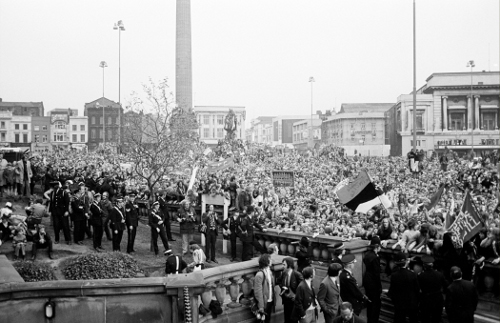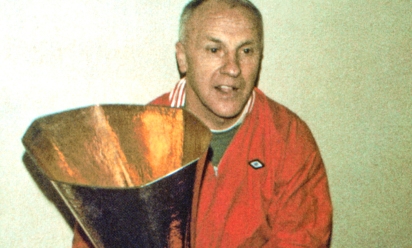'Win that shaped the footballing world'
On this day 40 years ago, Liverpool captain Tommy Smith lifted the club's first piece of European silverware after the Reds beat Borussia Monchengladbach 3-2 on aggregate in a two-legged UEFA Cup final.
To commemorate the landmark day in Liverpool history, we sat down with the club's historian Stephen Done to chat about the 1973 victory, which he termed as a win that 'shaped the footballing world'...
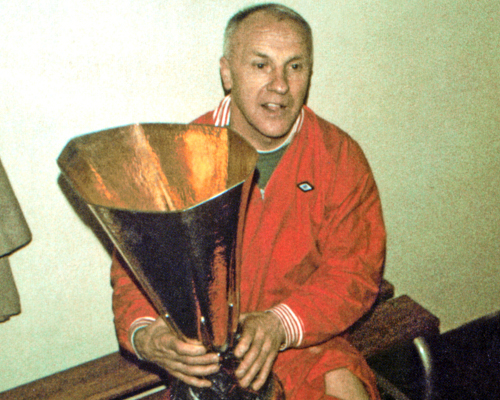
Before the double-winning season of 1972-73, when Liverpool lifted both the league title and the UEFA Cup, it had been some seven years since the Reds had claimed any success - the league win of 1966.
And yet despite this drought, the supporters, the board and the players had all remained incredibly patient. There had been no complaints or any suggestion that the manager, Bill Shankly, should step down.
And also, despite the lack of success, if you actually average-out attendances for each match of every Liverpool season, 1967-68 is still the best in the club's history, in terms of the sheer numbers of people watching.
In a year that was remarkable for being somewhat unremarkable, the turnout illustrated how the fans had, in no shape or form, lost interest or patience in following Liverpool.
In truth, as the 1960's came to a close they knew a lot of hard work had to be done; and by 1969-70 Shankly's first great side had all but run out of steam. But Shanks made big changes, and as a result of some inspired new blood injected into the side they reached the FA Cup final in 1971 and very nearly won it.
Although they lost that day, Shankly famously came back to St George's Plateau in the city centre, where the famous photograph of him, arms outstretched as he addressed the people, was taken as many thousands welcomed the losing side home like heroes.
The supporters worshipped him because they knew there was a rebuilding process in place and something good was about to happen, and they recognised the work being put in. Far from complaining, they were encouraging.
The team continued to improve and by the time we get to the summer of 1972, the feeling was that Liverpool might actually deliver the goods - and how!
They won the league title - which is always nice way of cheering everybody up after seven years of waiting. But if that was not an impressive enough achievement, at the end of that season, our captain Tommy Smith got his hands on the club's first ever European trophy.
The UEFA Cup win of 1973 can sometimes get over looked, but this is in many ways a defining moment.
It not only made Shankly a European title winner, it demonstrated that lessons were being learned about how to compete and win against difficult - and often largely unknown - opposition. In other words, how to win European titles.
It was a very exciting campaign in many ways...
In 2013, we're very conscious of the fact that German football is back in vogue and in the ascendancy again. The quality of the football is remarkable and there's plenty to admire, so it is interesting that back in 1972-73, German sides played a massive part in Liverpool's road to European success.

In order to get to the final, which was against the classy German outfit Borussia Monchengladbach - Liverpool first had to play Eintracht Frankfurt, a decent enough team, but one the Reds managed to deal with relatively comfortably, getting the campaign off to a steady start.
Then it was the turn of Dynamo Berlin, who in those days where on the other side of the Berlin wall and as a result were largely unknown - seeing live games from the GDR in the early 1970's was not an option.
Once again Liverpool were showing how far they had developed and with a balance of patience and attacking energy, didn't have too many difficulties moving on.
Reds fans were not finished with their German phrase-books though as they had to take on Dynamo Dresden. This was turning into travalogue across the (then) two Germanies, and a Liverpool were leaving their mark, and one that was not to be quickly forgotton by some of the German fans, as we shall see later.
Through all these games, they discovered that German football was robust, tough and at times very skilful, and they were some good players out there - followers of West Germany didnt need to be reminded of that fact.
The Reds played four different German sides in the run to the final, but undoubtedly, the best German side was reserved for last.
After beating Tottenham in the semi-final, the Reds met Monchengladbach. This was a two-legged final and the start of what was to be a series of encounters between the two clubs.
As a result of Liverpool gaining the upper hand, the two sets of fans started to develop a long-running relationship.
There is a huge supporters' group for Liverpool in Borussia. These people are Monchengladbach fans, but they've adopted Liverpool as their second side.
There's a wonderful, almost black sense of humour in this. Having lost in two finals to us (Bob Paisley's Reds would beat them in Rome in the 1977 European Cup final), they thought that they might as well just adopt Liverpool as their side!
They are very passionate supporters of the club and famously sing You'll Never Walk Alone. I think they decided that if they couldn't beat us they may as well join us, and also there was a mutual respect in recognising the quality of Liverpool's cup winning sides - just as we recongised the Moenchengadbach to be a truly excellent team.
So to the final - a slightly different affair to nowadays, as it was contested over two legs. And Liverpool, at the end of the first leg, would have liked the tie to have ended there.
It was 3-0 at the final whistle and they were in charge. Kevin Keegan was unstoppable - he could have had a hat-trick. As it happened, he got two, and Larry Lloyd got the third, and on the surface it looked like the job was as good as completed.
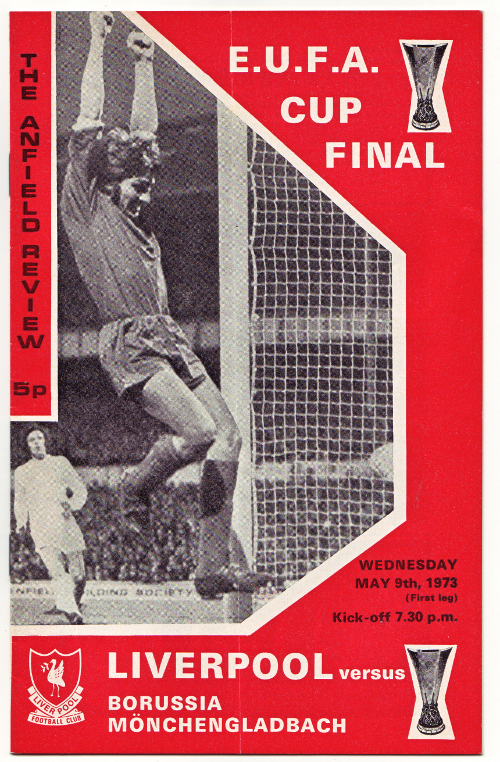
However, in truth, the 3-0 scoreline was misleading. The game at Anfield was started twice, after the referee ruled that rain was too bad for play to continue and halted the initial match on May 9 after only a few minutes of play.
That was all it took for Shankly to realise the German's physical presence and so when the game was replayed the next night, he swapped Brian Hall for the mighty John Toshack and it worked a treat. It is arguble that this inspired last minute change swung the game in our favour.
There were periods of the game when Liverpool were in complete and absolute control - they dominated the game and they really, really played some stunning football. Keegan and Toshack tore them apart up front.
But there were other parts of the game where you could tell that Borussia had something left in the tank, and they rattled the Liverpool defence on a number of occassions
It was only the genuis of Ray Clemence, who dived the correct way to stop a penalty kick from the almost unplayable Jupp Henynckes, that prevented the all-important away goal.
And so on to the second leg over in Germany, where Liverpool were close to being humbled.
They just couldn't find any answer to Borussia, who were absolutely stunning, and playing like a team who knew they could over come a 3-0 deficit in a European final (sound familiar?)
We have to remember that Borussia were probably the best club side in the world at the time. They were a jaw-droppingly good side and their class showed.
Liverpool had to use every ounce of their defensive skill in order to counteract the opposition, because Borussia pulled two goals back in the second leg and the game was now in danger of slipping away from the Reds.
However, Liverpool didn't let their heads go down. They were on the ropes, but they fought and they came through to the other side and won the cup.
You could draw some similarities between that final and the one in Istanbul in 2005. In a sense, Liverpool were almost like AC Milan of that year; in the first half of the 1973 final they were excellent and dominated proceedings, but in the second half they were undone.
However, unlike Milan in Istanbul, Liverpool did not wilt and they survived to win 3-2 on aggregate.
They had the great Ray Clemence in goal to thank once again but notably Chris Lawler in defence, who gave a 'Jamie Carragher-style' defensive performance.
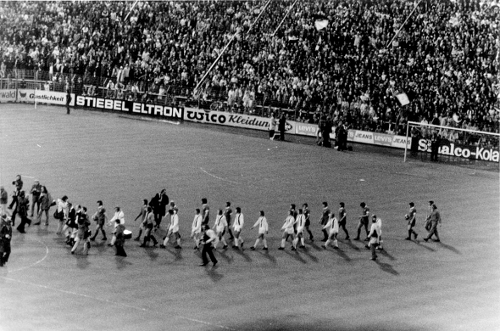
I think it's worth mentioning some of the names of the Monchengladbach players to fully realise just what sort of a side Liverpool were up against.
These guys made up the West Germany side that dominated world football - you've got Rainer Bonhoff, you've got Bertie Vogts, Gunter Netzer and then Heynckes, the current Bayern Munich boss, who scored twice in the second leg of the final. Heynckes especially caused immense headaches to Liverpool's fine defensive backline.
These are extraordinary players - and there were others in the side just as good, and they have since gone down in German football history, and yet Liverpool took them on and won.
The UEFA win of 1973 win started to re-shape the European footballing world, alerting some fine Mainland European opposition that the red and white cheker-board flags would be seen more and more frequently in their grounds.
In truth, it was a long time since the 1964-65 season, when Liverpool very nearly reached the European Cup final, but were robbed by Inter Milan in the semi's.
Liverpool, and the wet, gloomy loss to Borussia Dortmund in the Cup Winner's Cup in 1966, had all but been forgotten.
Our name had somewhat faded from the radar. But after winning the UEFA Cup in 1973, they pushed on to win the trophy again in 1976. Then of course, they won the European Cup in 1977, in 1978, in 1981 and then 1984.
So this is an incredibly important anniversary we are celebrating and a truly fantastic moment for the club.
Quite rightly Bill Shankly was made manager of the year in 1973, and in this, the centenary year of his birth, that we recall this great and historic moment.
It's absolutely central to Liverpool going on to winning the cup again and again. Shankly retired in 1974 and Bob Paisley stepped in.
And by the time he gets the opportunity to make a good crack at Europe in 1976, you get the sense that he and his backroom staff, together with his players, have really learned about how to play in Europe - and what a run they would go on....
